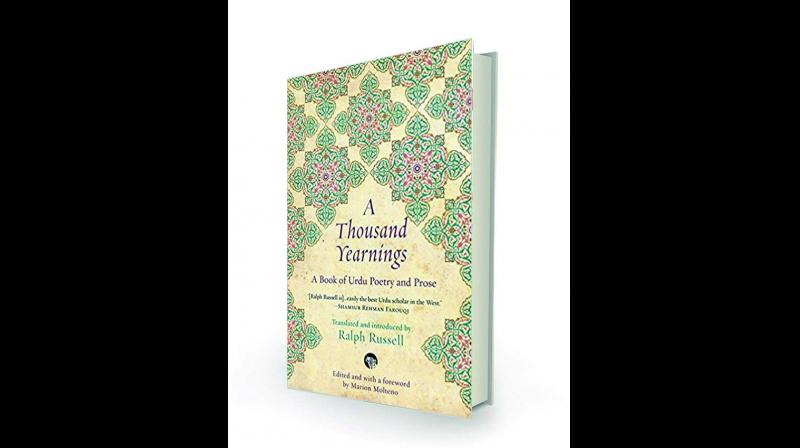Book Review 'A Thousand Yearnings: A Book of Urdu Poetry & Prose'
A peek into the world of Urdu.

Last week when this book landed, it held promise. After all, the lethal combination couldn’t be overlooked! Urdu poetry and prose translated and introduced by Ralph Russell, the respected British scholar of Urdu literature, edited by South African novelist Marion Molteno, and published by Ravi Singh’s Speaking Tiger. This anthology, aptly described as a “treasure trove of stories, poetry and history”, was originally published in 1995 as Hidden in the Lute, Anthology of Two Centuries of Urdu Literature, and this latest revised edition has been put together by Russell’s long-time friend-cum-literary executor, Marion, a winner of the 1999 Commonwealth Writers’ Prize.
I’m glad she did so, for it’s one of those volumes that can carry one through mood swings, emotional turbulence and whatever else we humans have to go through. Russell, who passed away in 2008, was one of the greatest Western scholars of Urdu. For 30 long years he headed the Urdu department at the School of Oriental and African Studies, University of London and stood out as one of the finest translators of Urdu poetry and prose.
In fact, Khushwant Singh once described him as “the most revered name of interpreters of Ghalib’s life and works”. No wonder then that the anthology prepared by this literary genius contains masterpieces by storytellers and word-renderers of the last so many decades, interspersed with lilting romantic verse.
For days and several nights I have been sitting with this volume clutched tight in my hands, reading and re-reading this anthology laden with the works of Prem Chand, Ismat Chughtai, Rashid Jahan, Krishan Chander, Saadat Hasan Manto, Shaukat Thanvi, Khwaja Hasan Nizami…
If that wasn’t treat enough, there is an entire segment of love poetry. Sublime ghazals of Mir and Ghalib illuminate and seduce.
Reading these emotion-dripping verse one is bound to cry aloud: “Hey, why are such romantic poets no longer around? Why is no one writing such heady verse! Want to be loved and pampered by such lovers!”
Of course, long gone are the romantic poets of yesteryears, leaving their emotion-laden lines for you and I to sigh along, like these lines from Ghalib:
You stand away, and purse your lips
and show their rosebud form
I said “How do you kiss?”
Come, kiss my lips and say “Like this!”
And also from Mir:
My love, I cannot tell the tale of all the things I want from you
A hundred longings fill my soul, a thousand yearnings throng my heart.
I am so overwhelmed reading this anthology that if Russell was alive I would have got in touch with him. Since that is not possible, it’s best to quote him from the very introduction to this volume: “This book presents a selection of Urdu Literature for anyone who cannot read Urdu but is interested to find out what it has to offer. Apart from people who count English as their mother tongue, there are many to whom this description applies… The poet Ghalib talks, in one of his ghazals, about ‘…the music of His secrets/Hidden no more than melody is hidden in the lute’, I like to think of the ‘melody’ as the charm of Urdu literature and the ‘lute’ as the language in which it is written. I hope that in doing these translations I have played the lute in a way which reveals the melody.”
Russell has played the lute and played it rather well, with much passion. After all, this Englishman was in love with Urdu and with all its renderers.
“…my selection has been limited to work which is not only good, but is likely to appeal to an audience encountering Urdu Literature for the first time… I expect that most Muslim readers will particularly regret my omission of anything from the poet Iqbal. But Iqbal is, above all, a Muslim poet, and makes his most powerful appeal to his fellow Muslims. Many readers of this book may be non-Muslims and though (as I have shown in The Pursuit of Indian Literature) if his message is fully understood it can be valid for all humankind…” writes Russell.
In fact, the more one delves into Russell’s writings and works, the more it becomes apparent how deeply committed he was to the Urdu language, making certain that it reaches out to as many people as possible.
As his friend Marion Molteno writes in the foreword to this anthology: “The book you are about to read is the work of an Englishman who became an eminent scholar and translator of Urdu. He felt that his close engagement with Urdu speakers and their literature had immeasurably enriched his life. So he directed his considerable intellect and energy to sharing what he had learnt by teaching and translating Urdu literature to make it accessible to people who didn’t know the language.”
As one of those unfortunate ones whose knowledge of my mother tongue, Urdu, is basic and raw, and which, in the prevailing political scenario, stands lynched, I want to sign off by saying, Thank you, Russell sahib.

